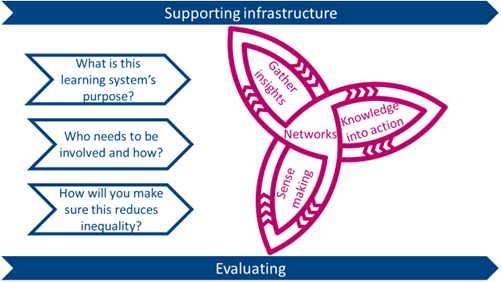A learning system enables a group of people to come together to share and learn about a particular topic, to build knowledge and accelerate improved outcomes. It connects and influences people and develops their understanding.
A learning system should:
- support individuals to learn through its culture and networks
- be informed by evaluation and reflective practice
- enable people to assess what is and isn’t working through the use of qualitative and quantitative data, stories and insights
- develop processes to aid decision-making and turn knowledge into action, build systems that identify “bright spots” and generalisable learning
- be a core element of any governance structure – for example, in a management meeting or as part of a change project
What are the benefits
Learning Systems draw together continual reflections to review, plan and improve quality. They use a measurement system to gather insights about what is and what is not working and use evidence to inform decisions. This includes identifying learning that can be generalised and spread.
Learning Systems bring together individuals and services working on similar challenges to work together in learning networks. They support putting knowledge into action. Importantly, they value and enable a culture of continual reflective practice.
What are the core components

The image above shows the core components of learning systems.
Establishing a learning system
Establishing a learning system takes investment in people and infrastructure to enable teams, organisations and systems to learn and change.
How learning supports change
Learning Systems are important in supporting change by enabling continual, rapid learning from iterative testing. They support systems that share knowledge and findings created in change.
Understanding and evaluation
Learning systems support people and organisations to understand and evaluate how services operate and the impact of the changes they are making.
People who support your learning
From our experience of leading change programmes, there are two main roles which are essential to creating the infrastructure and culture which embed learning in change.



